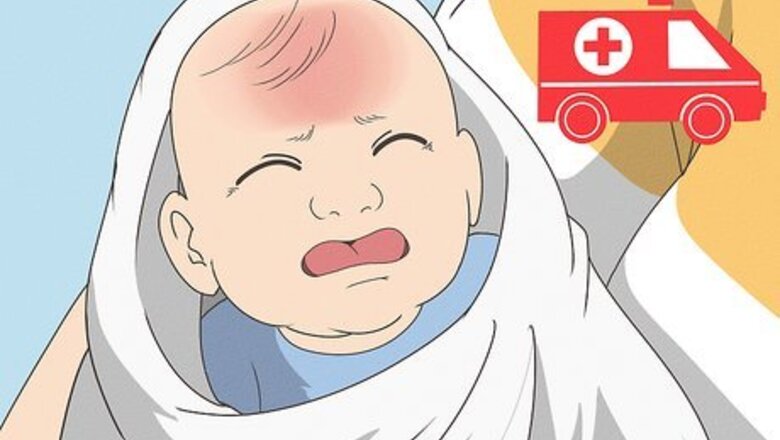
views
Do I need to call the doctor if my newborn has a fever?
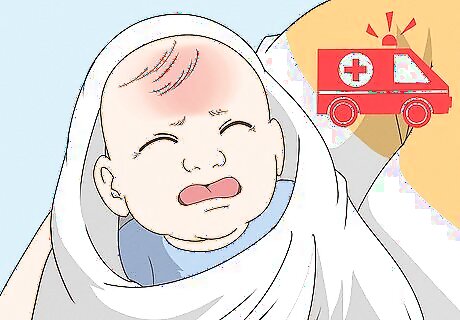
Yes, take your newborn to see a doctor immediately if they have a fever. If your baby is less than 2 months old, don't try to break their fever at home. Call their pediatrician right away if they develop a fever of 100.4 °F (38.0 °C) or higher. If their office is closed, don't hesitate to take your baby to the emergency room. The doctor will examine your baby and come up with a customized treatment plan.
How do you break a baby's fever?
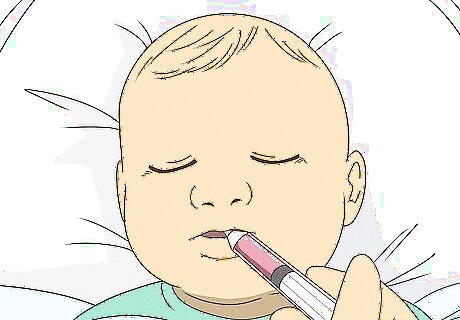
Give your baby fever-reducing medication if they're over 2 months old. It's hard to watch your baby fight a fever, but medication can make them more comfortable and help the fever go down. If your baby's pediatrician recommends medication, give them acetaminophen or ibuprofen if they're over 6-months old. For: Liquid infant acetaminophen: give 1.25 ml if your baby weighs between 12 to 17 pounds (5.4 to 7.7 kg) or 2.5 ml if they weigh between 18 to 23 pounds (8.2 to 10.4 kg) Liquid infant ibuprofen: give 2.5 ml if they weigh between 12 to 17 pounds (5.4 to 7.7 kg) or 3.75 ml if your baby weighs between 18 to 21 pounds (8.2 to 9.5 kg). Infant ibuprofen drops: give 1.25 ml if your baby weighs between 12 to 17 pounds (5.4 to 7.7 kg) or 1.875 ml if they weigh between 18 to 21 pounds (8.2 to 9.5 kg).
How can I reduce my baby's fever naturally?
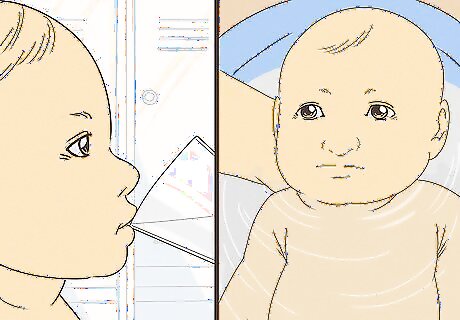
Give your baby extra fluids so they stay hydrated. Your baby's body is working hard to regulate their temperature and they need fluids to do it! If your baby is under 6 months old, give them as much breast milk or formula as they'll take. To encourage older babies to drink, it's safe to offer water or diluted fruit juice, too. Snuggle as you feed them—being held can make your baby feel reassured. It's really important to prevent dehydration when your baby has a fever. Encouraging your baby to drink even for a minute or two can help them feel better and help them stay hydrated.
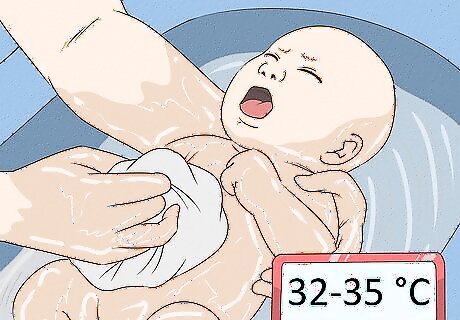
Give your baby a lukewarm bath to lower their temperature. Fill a baby bathtub with about 2 inches (5.1 cm) of water that's between 90 and 95 °F (32 and 35 °C) and set them into it. Support your baby and gently splash the lukewarm water over their arms, legs, and tummy. You may sing or talk gently while you do this to help your baby relax. Never walk away from the baby while they're in the bath. If your baby can't control their head yet, don't forget to support their neck. A cold bath might seem like a good idea, but it can actually shock their system. If your baby shivers a lot, their body temperature will actually go up.
What are fever levels for babies?
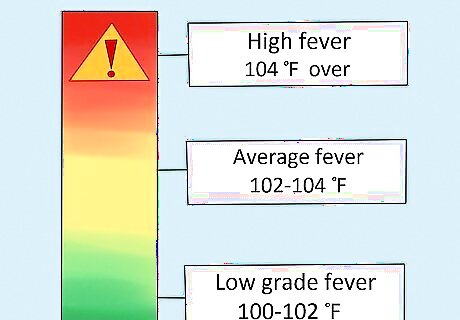
A temperature of 100 to 102 °F (38 to 39 °C) is a low-grade fever. Your healthy baby's temperature is usually between 97 and 100.4 °F (36.1 and 38.0 °C), so anything over this is a low fever. Usually, in kids over 2 months, there's no need to worry and you don't need to break the fever since it's a sign that your baby's body is fighting something on its own. It's a good idea to keep taking your baby's temperature so you can see if it gets higher. When your baby has a low fever, they may seem a little fussy or clingy. Give your baby extra cuddles and attention to help them feel better. Monitor their symptoms. If the fever lasts 2-3 days and/or they seem lethargic, call your doctor.
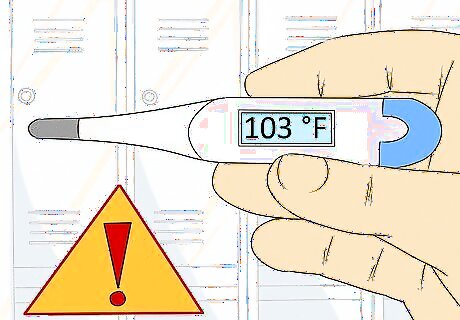
A temperature of 102 to 104 °F (39 to 40 °C) is an average fever for babies over 3 months old. This might seem high, but it means that your baby's body is effectively fighting something. To make your baby more comfortable, you can give infant acetaminophen. Watch for other symptoms of illness and keep track of how long your baby has had a fever. If you have to call the doctor or a nurse hotline, they'll ask you for details about your baby's fever.
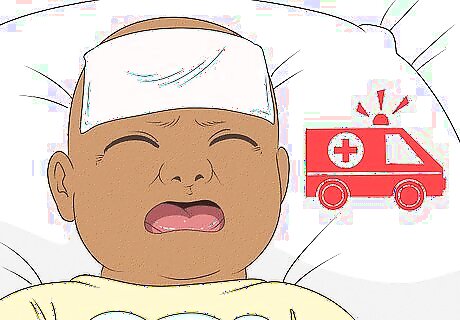
Anything over 104 °F (40 °C) is a high fever. A high temperature can be frightening—your baby is probably acting differently or lethargic. Call the doctor right away or take your baby to the emergency room, especially if their fever is over 106 °F (41 °C). The medical team can find out what's causing the fever and they may give your baby fluids so they stay hydrated. It's really important to get medical attention for a high fever. If it's after hours at the doctor's office, take your baby to the emergency room.
How should I dress my baby when they have a fever?
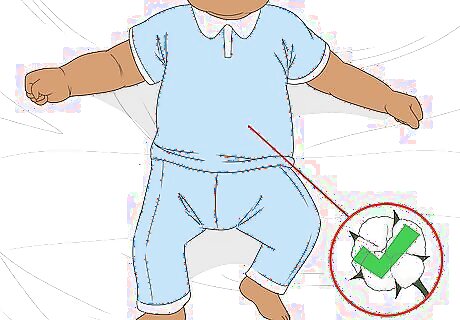
Put them in lightweight clothes so you're not trapping heat. Instead of layering clothes or swaddling your baby, dress them in a simple onesie that's made of breathable fabric like cotton. Wearing a loose single layer can keep your baby comfier than lots of heavy layers. If your baby sweats through their clothes, change them right away. Leaving wet clothes against their skin could actually make them chilly. If your baby starts to shiver, it's a sign that they're a little cold. It's totally fine to lay a thin blanket or sheet over them, but don't automatically dress them in heavy clothes or they may overheat.
When should I take my baby to the doctor?
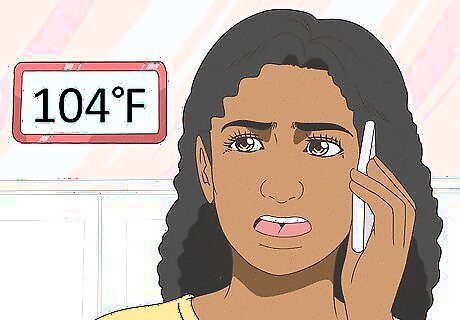
Call the doctor if your newborn has a fever. If your baby is less than 2 months old and they have a temperature of 100.4 °F (38.0 °C) or higher, it can be scary! Don't hesitate to call your baby's pediatrician even if they don't have any other symptoms. The doctor will probably ask you to bring the baby in for an exam to rule out other medical conditions.
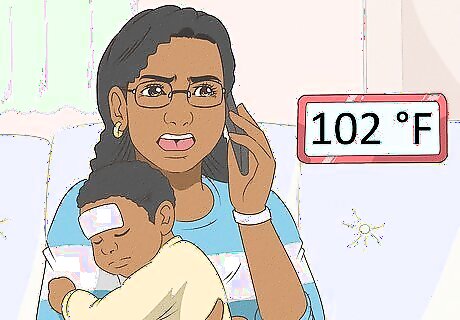
Contact the pediatrician if your 3- to 6-month-old has a fever of 102 °F (39 °C). If your baby has a low fever and is acting normally, keep an eye on their temperature and make them as cozy as possible. If they're acting irritable or unusually tired and they have a fever, call the doctor. Hold your baby, snuggle them, or sing to reassure them while you talk to the doctor. Your doctor might have you bring your baby in or they may give you medication instructions.
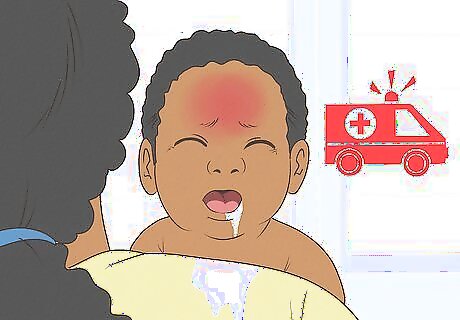
Get medical attention if your baby's temperature doesn't improve after 1 day. If you have a baby that's older than 6 months and their temperature is over 102 °F (39 °C), see if acetaminophen or ibuprofen makes the fever go away. Call the doctor if the fever lasts for more than 1 day or they have other symptoms like diarrhea, coughing, or vomiting. You should also call the doctor if your baby has a lower fever that lasts for more than 2-3 days.













Comments
0 comment